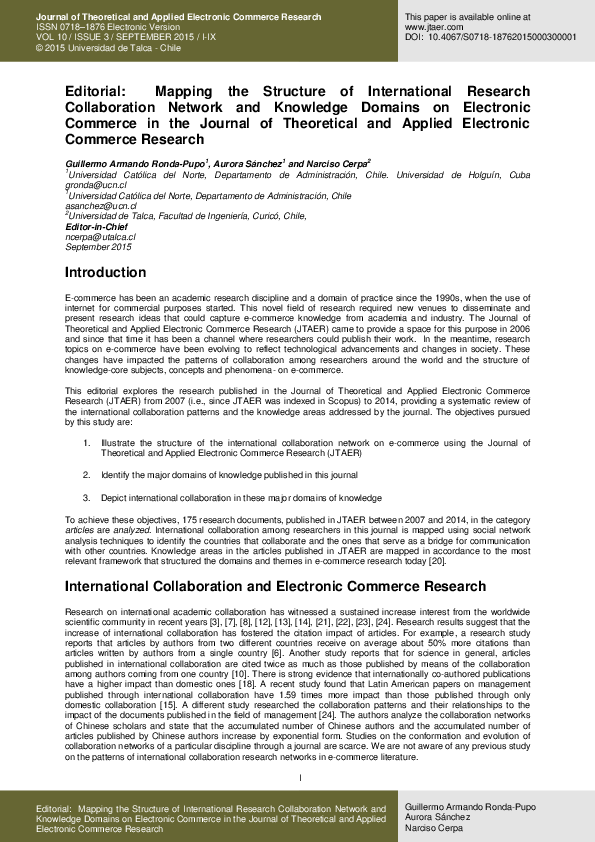在线评论对消费者购买意向的影响:研究在线评论、群体相似性和自我概念的社会影响
IF 5.1
3区 管理学
Q1 BUSINESS
Journal of Theoretical and Applied Electronic Commerce Research
Pub Date : 2024-05-10
DOI:10.3390/jtaer19020055
引用次数: 0
摘要
消费者在做出购买决定时,往往依赖于其他消费者分享的在线评论等评价。在线评论已成为一种重要的营销工具,与传统方法相比,它通过增进消费者之间的信任而具有明显优势。以往的研究发现,消费者与评论者之间的群体相似性是一个关键变量,可能对消费者的反应和购买意向产生影响。然而,研究结果仍未得出结论。在本研究中,我们将自我概念和群体相似性视为在线评论评级影响消费者购买意向的关键因素。我们进一步研究了消费者的自我建构在影响消费者对在线评论的归属感和诊断性方面所起的作用。为验证假设,我们对通过亚马逊机械土耳其(MTurk)收集的 276 名受试者进行了 2(在线评论评分)×2(群体相似性)×2(自我建构)方差分析,并使用对比分析和 PROCESS 宏模型 12 进行了交互效应分析和调节中介分析。我们的研究结果表明,具有相互依存自我结构的消费者在购买意向方面对评论评分和群体相似性都很敏感。当群体相似度和在线评论评分都很高时,他们会表现出积极的购买意向。然而,当群体相似度较低时,他们的购买意向不受评论评级的影响。相反,无论群体相似度如何,当在线评论评分较高时,具有独立自我概念的消费者会表现出更积极的购买意向。此外,我们的研究还强调了感知诊断性和归属感在网络评论评分、群体相似性、自我建构和购买意向之间的中介作用。研究结果表明,感知诊断性和归属感具有明显的间接效应,这意味着在线评论评分对购买意向的影响是由这两个变量中介的。我们的研究成果提供了有关在线评论的理论和实践意义,并为在线消费者行为领域的未来研究提出了新的途径。本文章由计算机程序翻译,如有差异,请以英文原文为准。
The Impact of Online Reviews on Consumers’ Purchase Intentions: Examining the Social Influence of Online Reviews, Group Similarity, and Self-Construal
Consumers often rely on evaluations such as online reviews shared by other consumers when making purchasing decisions. Online reviews have emerged as a crucial marketing tool that offers a distinct advantage over traditional methods by fostering trust among consumers. Previous studies have identified group similarity between consumers and reviewers as a key variable with a potential impact on consumer responses and purchase intention. However, the results remain inconclusive. In this study, we identify self-construal and group similarity as key factors in the influence of online review ratings on consumers’ purchase intentions. We further investigate the role of consumers’ self-construal in shaping consumers’ perceptions of online reviews in terms of belongingness and diagnosticity. To test the hypothesis, we conducted a 2 (online review rating) × 2 (group similarity) × 2 (self-construal) ANOVA on 276 subjects collected through Amazon Mechanical Turk (MTurk), and contrast analysis and PROCESS macro model 12 were used for the interaction effect analysis and moderated mediation analysis. Our findings reveal that consumers with an interdependent self-construal are sensitive to both review ratings and group similarity with regards to their purchase intentions. They demonstrate a positive purchase intention when both group similarity and online review ratings are high. However, their purchase intention is not influenced by review ratings when group similarity is low. Conversely, consumers with an independent self-construal exhibit a more positive purchase intention when the online review rating is high, irrespective of group similarity. Additionally, our study highlights the mediating roles of perceived diagnosticity and belongingness in the relationship between online review ratings, group similarity, self-construal, and purchase intentions. Results show significant indirect effects for perceived diagnosticity and belongingness, meaning that the impact of online review ratings on purchase intention is mediated by these two variables. The outcomes of our research offer theoretical and practical implications concerning online reviews and suggest new avenues for future research in the area of online consumer behavior.
求助全文
通过发布文献求助,成功后即可免费获取论文全文。
去求助
来源期刊
CiteScore
9.50
自引率
3.60%
发文量
67
期刊介绍:
The Journal of Theoretical and Applied Electronic Commerce Research (JTAER) has been created to allow researchers, academicians and other professionals an agile and flexible channel of communication in which to share and debate new ideas and emerging technologies concerned with this rapidly evolving field. Business practices, social, cultural and legal concerns, personal privacy and security, communications technologies, mobile connectivity are among the important elements of electronic commerce and are becoming ever more relevant in everyday life. JTAER will assist in extending and improving the use of electronic commerce for the benefit of our society.

 求助内容:
求助内容: 应助结果提醒方式:
应助结果提醒方式:


